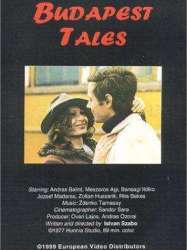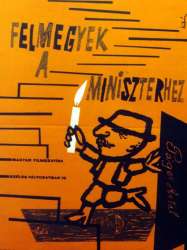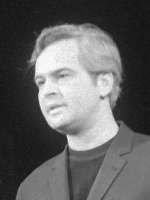Zoltán Huszárik is a Actor, Director, Scriptwriter, Second Assistant Director and Editor Hongrois born on 13 may 1931 at Domony (Hongrie)

Zoltán Huszárik (born József Zoltán Huszárik, May 14, 1931 - October 15, 1981) was an influential Hungarian film director, screenwriter, visual artist and occasional actor, an acclaimed auteur of the European modern art film.
Huszárik was born in the small village of Domony, Hungary. His father died when he was two years old. Being an only child, Huszárik had an adoring relationship with his widowed mother. His background had a great influence on his work.
He was accepted to the Hungarian School of Film- and Theatrical Arts, but was expelled in 1952 because his family was blamed to be Kulaks. He took on different jobs, when—after a seven-year hiatus—he was again accepted to the film school in 1959. In the same year he made his first student film, a short entitled Játék (Game) about two prisoners playing chess with the shadow of their bars when the sun shines unto their cell. Huszárik's graduation film was another short entitled Groteszk (Grotesque) in 1963 about a strange train voyage of an artist carrying his own picture.
Huszárik made his first professional short film in 1965 at Béla Balázs Studios entitled Elégia (Elegy). This 20-minute experimental short film was generally acclaimed as being the starting point of a new visual style in Hungarian filmmaking. Often called a "film poem" or a "film symphonie" Huszárik's masterpiece consists of montages of horses from the dawn of time to the modern times from cave paintings to horse races, mourning the loss of these creatures and their service to mankind, starting as free animals and becoming slaughterhouse victims. The film is generally regarded as an allegory to the human fate.
Huszárik made another experimental short film called Capriccio (about snowmen melting in the spring as an allegory to man's ultimate fate - death) and a short documentary on Hungarian-born artist Amerigo Tot, both in 1969. He also directed several state-financed educational short films in this period.
In 1971 Huszárik finished his first feature-length work Szindbád (Sinbad), a highly stylized adaptation of early 20th century author Gyula Krúdy's short stories. The film depicts the life and memories of traveler and womanizer Szindbád (played by Zoltán Latinovits), who tries to recover his lost love before he dies. The film which covers time and memory in an unusual way, was praised by critics and was a commercial success upon its release and is generally regarded now as one of the best works of Hungarian cinema.
Huszárik made two experimental shorts in 1971 and 1976, entitled Tisztelet az öregasszonyoknak (Homage to Old Ladies) and A Piacere (As You Like It), respectively. The first is a homage to the old country widows whose husbands died in World War II and live their lives according to daily tasks and regulations until they die (which is mainly inspired by Huszárik's own mother). The second is a study of death in its various forms, including a gypsy "merry funeral" and stock footage of bombings and concentration camps in WWII.
The second (and last) feature-length film of Huszárik was made after a five-year struggle. Csontváry depicts the life of Hungarian artist Tivadar Csontváry Kosztka and an actor playing him in a film (both played by Bulgarian actor Ichak Finci), with the two men' lives interacting with each other. After the death of Latinovits, who was the original choice for the dual role, the film went on through several re-writes, re-shoots, casting and budget problems, finally ending up as the most expensive Hungarian production at the time. The film was finally completed and released in 1980. It was a huge failure with the public and critics also bashed it. Huszárik who was greatly exhausted, depressed and an alcoholic at the time committed suicide in 1981 at the age of 50.
Huszárik originally wanted to be a visual artist. He made several paintings, drawings and other pieces of art during his lifetime. He also took smaller acting jobs in the films of fellow Hungarian directors, including István Szabó's Budapesti mesék (Budapest Tales). His daughter, Kata Huszárik is an acclaimed actress.
Dans Sindbad en 1971, son premier long métrage, Zoltán Huszárik ressuscite le héros principal de l'œuvre du grand écrivain hongrois Gyula Krúdy dont le thème est la quête amoureuse . Csontváry en 1980 est un émouvant hommage au peintre naïf hongrois, Tivadar Kosztka Csontváry.
Source : Wikidata
Zoltán Huszárik

- Infos
- Photos
- Best films
- Family
- Characters
- Awards
Nationality Hongrie
Birth 13 may 1931 at Domony (Hongrie)
Death 15 october 1981 (at 50 years) at Budapest (Hongrie)
Awards Kossuth Prize
Birth 13 may 1931 at Domony (Hongrie)
Death 15 october 1981 (at 50 years) at Budapest (Hongrie)
Awards Kossuth Prize
Huszárik was born in the small village of Domony, Hungary. His father died when he was two years old. Being an only child, Huszárik had an adoring relationship with his widowed mother. His background had a great influence on his work.
He was accepted to the Hungarian School of Film- and Theatrical Arts, but was expelled in 1952 because his family was blamed to be Kulaks. He took on different jobs, when—after a seven-year hiatus—he was again accepted to the film school in 1959. In the same year he made his first student film, a short entitled Játék (Game) about two prisoners playing chess with the shadow of their bars when the sun shines unto their cell. Huszárik's graduation film was another short entitled Groteszk (Grotesque) in 1963 about a strange train voyage of an artist carrying his own picture.
Huszárik made his first professional short film in 1965 at Béla Balázs Studios entitled Elégia (Elegy). This 20-minute experimental short film was generally acclaimed as being the starting point of a new visual style in Hungarian filmmaking. Often called a "film poem" or a "film symphonie" Huszárik's masterpiece consists of montages of horses from the dawn of time to the modern times from cave paintings to horse races, mourning the loss of these creatures and their service to mankind, starting as free animals and becoming slaughterhouse victims. The film is generally regarded as an allegory to the human fate.
Huszárik made another experimental short film called Capriccio (about snowmen melting in the spring as an allegory to man's ultimate fate - death) and a short documentary on Hungarian-born artist Amerigo Tot, both in 1969. He also directed several state-financed educational short films in this period.
In 1971 Huszárik finished his first feature-length work Szindbád (Sinbad), a highly stylized adaptation of early 20th century author Gyula Krúdy's short stories. The film depicts the life and memories of traveler and womanizer Szindbád (played by Zoltán Latinovits), who tries to recover his lost love before he dies. The film which covers time and memory in an unusual way, was praised by critics and was a commercial success upon its release and is generally regarded now as one of the best works of Hungarian cinema.
Huszárik made two experimental shorts in 1971 and 1976, entitled Tisztelet az öregasszonyoknak (Homage to Old Ladies) and A Piacere (As You Like It), respectively. The first is a homage to the old country widows whose husbands died in World War II and live their lives according to daily tasks and regulations until they die (which is mainly inspired by Huszárik's own mother). The second is a study of death in its various forms, including a gypsy "merry funeral" and stock footage of bombings and concentration camps in WWII.
The second (and last) feature-length film of Huszárik was made after a five-year struggle. Csontváry depicts the life of Hungarian artist Tivadar Csontváry Kosztka and an actor playing him in a film (both played by Bulgarian actor Ichak Finci), with the two men' lives interacting with each other. After the death of Latinovits, who was the original choice for the dual role, the film went on through several re-writes, re-shoots, casting and budget problems, finally ending up as the most expensive Hungarian production at the time. The film was finally completed and released in 1980. It was a huge failure with the public and critics also bashed it. Huszárik who was greatly exhausted, depressed and an alcoholic at the time committed suicide in 1981 at the age of 50.
Huszárik originally wanted to be a visual artist. He made several paintings, drawings and other pieces of art during his lifetime. He also took smaller acting jobs in the films of fellow Hungarian directors, including István Szabó's Budapesti mesék (Budapest Tales). His daughter, Kata Huszárik is an acclaimed actress.
Biography
Zoltán Huszárik est diplômé de l'École supérieure de théâtre et de cinéma de Budapest en 1962. Il illustre une tendance du cinéma hongrois qui plonge ses racines dans l'art pictural. Peintre et dessinateur, il considère ses films comme l'aboutissement de son travail plastique. Sa filmographie se nourrit également d' « aspects très profonds de la tradition nationale ». Ainsi, son premier court métrage, Élégie (1965), se présente comme un poème visuel sur le cycle de la vie et de la mort de l'un des anciens symboles de la Hongrie, le cheval. Cette réalisation lui vaut une réputation internationale.Dans Sindbad en 1971, son premier long métrage, Zoltán Huszárik ressuscite le héros principal de l'œuvre du grand écrivain hongrois Gyula Krúdy dont le thème est la quête amoureuse . Csontváry en 1980 est un émouvant hommage au peintre naïf hongrois, Tivadar Kosztka Csontváry.
Usually with
Filmography of Zoltán Huszárik (4 films)
Actor

Budapest Tales (1977)
, 1h30Directed by István Szabó
Genres Drama
Actors Ági Mészáros, Franciszek Pieczka, Maja Komorowska, András Bálint, Ildikó Bánsági, József Madaras
Rating66%





Director

Sinbad (1971)
, 1h30Directed by Zoltán Huszárik
Genres Drama
Actors Zoltán Latinovits, Margit Dajka, Éva Ruttkai, Ildikó Bánsági
Rating74%





The film opens with a sequence of fleeting images - the stamens of a flower, drops of oil on water, glowing embers, a spider's web, a strand of blonde hair, a leaf frozen in the ice, rain dripping from a wooden roof, etc. - each of which will subsequently be linked to one of Szindbád's memories of his love affairs. We then see the body of the dead or dying Szindbád lying in a cart drawn by a horse through the countryside, where nobody any longer seems interested in him. A voiceover (of Szindbád) then introduces a stream of memories, often disconnected and unchronological, of the many women who have been the focus of his life.
Scriptwriter

Sinbad (1971)
, 1h30Directed by Zoltán Huszárik
Genres Drama
Actors Zoltán Latinovits, Margit Dajka, Éva Ruttkai, Ildikó Bánsági
Rating74%





The film opens with a sequence of fleeting images - the stamens of a flower, drops of oil on water, glowing embers, a spider's web, a strand of blonde hair, a leaf frozen in the ice, rain dripping from a wooden roof, etc. - each of which will subsequently be linked to one of Szindbád's memories of his love affairs. We then see the body of the dead or dying Szindbád lying in a cart drawn by a horse through the countryside, where nobody any longer seems interested in him. A voiceover (of Szindbád) then introduces a stream of memories, often disconnected and unchronological, of the many women who have been the focus of his life.
Director

Current (1964)
, 1h21Directed by István Gaál
Origin Hongrie
Genres Drama
Actors Andrea Drahota
Roles Assistant Director
Rating73%





L'été dans un village au bord de la Tisza. Un groupe de jeunes gens vont s'y baigner dans une atmosphère ludique et détendue. Mais, une des jeunes filles découvre soudain qu'un des garçons a disparu. Des recherches vont être entreprises, hélas non couronnées de succès. La couleur de la vie change pour tout le monde et les adolescents apprennent le sens des responsabilités…

I'll Appeal to the Minister (1962)
, 1h40Genres Comedy
Actors Antal Páger, Ferenc Zenthe
Roles Second Assistant Director
Rating73%





Editor

Sinbad (1971)
, 1h30Directed by Zoltán Huszárik
Genres Drama
Actors Zoltán Latinovits, Margit Dajka, Éva Ruttkai, Ildikó Bánsági
Roles Editor
Rating74%





The film opens with a sequence of fleeting images - the stamens of a flower, drops of oil on water, glowing embers, a spider's web, a strand of blonde hair, a leaf frozen in the ice, rain dripping from a wooden roof, etc. - each of which will subsequently be linked to one of Szindbád's memories of his love affairs. We then see the body of the dead or dying Szindbád lying in a cart drawn by a horse through the countryside, where nobody any longer seems interested in him. A voiceover (of Szindbád) then introduces a stream of memories, often disconnected and unchronological, of the many women who have been the focus of his life.
 Connection
Connection



